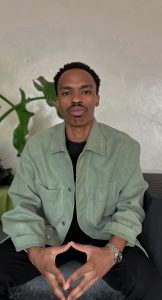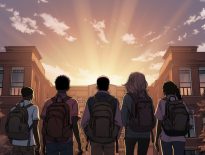On the warm afternoon of October 2, 2020, my mother received a phone call from a relative of my best friend. Instinctively, she tried to hand me the phone, but the person on the other end asked that she hear the news first to relay it to me with caution. After some formalities, my mother was told that my friend of ten years had suddenly passed away. It was the first significant death I had experienced. The weight of grief descended on me in an unexpected way and caused an instinctive urge to try and make sense of life’s dissonance and futility. In retrospect, I did not know that the urge to try and make sense of life would lead me to even more deaths.
The sad truth about life is death looms over us in every waking moment, the slyness of it creeps and hovers over every birthday party, baby shower, graduation and mundanity of the collection of days, months and years we occupy in our lives. It feels like a cruel exchange: we offer our experience of living, of growing, of finding ourselves in this maze of existence. Along the way, we open our hearts—sometimes cautiously, sometimes freely—to love, to our families, friends, and lovers. Yet, we are bartered with the callous eventuality of death. It is a question that sticks like chewing gum onto the boots of time, “Why is death so cruel?” On that ominous October afternoon, I was forced to ask the same question.
Read – Two Wheels, Soul Mover – A Creative Non-Fiction by Brianna Matheka – Kenya
With death comes retrospection. The minute I heard that my friend had passed, my mind flooded with all the things I hadn’t said to him. The things I wanted to articulate with the language I now had because of the grief I was going through. I was going back to a well that had inexplicably dried up, calling a familiar number and hearing the trapped sound of a voicemail that would ironically live on, same message, same voice, devoid of response.
The funny thing is that I believe from the beginning of our friendship my friend had planted seeds of posterity to guide me through the pain of losing him. We first met when I was in eighth grade, searching for transportation to school. I expected an elderly driver, someone who had been transporting kids for years. But instead, a chubby, fresh-faced man in his thirties greeted me with the kindest eyes and the warmest smile. I vividly remember his eyes every morning actively searching the rearview mirror to try to find my face and gauge my mood. He was the first person to invite me to church and introduce me to kids who had the same teenage angst I had. He quickly became more than just a driver; he was a mentor, a father figure, a mirror of self-realization—and most importantly, a friend. Because he was older than I was, I always felt like I was arriving towards a better level of maturity as our friendship grew.
When I lost him, it felt like a significant part of my identity drifted away from me. I was now swimming towards the rummage of the memories he had left behind and praying that I could find something to speak to, something solid and dependable like he was. I wish I was lucky enough to find even the faintest voice that would guide me through the grief he had left me with, but what I kept on running into was the eventuality that every time I tried to reach out for his being, I was reminded of its absence and therefore relived his death in a new way every single day.
As I fished for the answers of resolution from the past, life continued its truculent trajectory forward. In all honesty, I do not remember the days leading up to my friend’s funeral nor do I think I was present enough in my emotions to fully grasp the weight of it all, but as the months went on and the realization became clearer, grief with its sticky envelopment started to seep into every crevice of my life. At first, I told myself I would “deal with it” when I was ready to carry the full weight of my emotions. As you can imagine, that plan failed miserably. Grief, no matter how much we try to organize and categorize it, demands to be acknowledged.
All I had left were memories and a journey that seemed to stretch out endlessly. Exhausted by the search, I decided one morning to write my friend a letter. I expected to rant, to vent my anger and frustrations at him, but instead, I found myself remembering something he often said when he felt conflicted—a personal mantra, almost: “As long as your heart’s attitude is in the right place, everything else will fall into place.” It was a reminder that everything we do should be intentionally guided by doing good and that if we cared enough, it would essentially be enough. When I was younger it made sense from a motivational standpoint but never tugged at my soul until I wrote it down in his absence. I realized at that moment that I cared about someone very deeply and in the search to find him again, I found that He cared about me as well. Retrospection was not just an invitation to wallow in grief, but it was also an opportunity to care about my friendship from an intentional place, to cry about it, to complain, to be angry about it but to always give it the reverence it deserved, because in the short tenure my friend had occupied on earth, he loved me with the right heart’s attitude.
Read – My Fractured Identity – A Creative Non-Fiction by Angel J Okonkwo – Nigeria
Grief is not a linear experience. The days are almost never the same. Some days, I feel eager to tell him about my life—my growing relationship with Christ, my new job, the latest show I’m watching, or the new relationship I’m in. On other days, I feel guilty for living my life, for moving forward without him, for forgetting his face at times or for not checking in on his family on his birthday. There’s still so much confusion and a pervading feeling that the further I move away from my own grief, the further I move away from my friend.
I often remember sitting with him in the car, talking endlessly about whatever obsession had captured my attention at the time. He would just sit there and actively engage with a faint smile of approval and confusion. Half of the time he didn’t have a clue about what I was talking about, but that smile gave me the reassurance that someone was listening to me. Life continues to introduce me to new valleys and new journeys of self-realisation. I continue to encounter even more metaphorical and real-life deaths. In those times of confusion, when I feel so lonely in my head and unloved in my existence, I still long for that faint smile to acknowledge me again, for someone to look at the rearview mirror and tell me that they see me.
——-

Owami Hugo Jackson is a writer, filmmaker, and storyteller based in Johannesburg, South Africa. He believes in the transformative power of writing to inspire change—not only within ourselves but in the world around us. Fascinated by the idiosyncrasies of human connection, Owami’s writing delves into themes of love, grief, and belonging. Influenced by literary icons such as James Baldwin, Keorapetse Kgositsile, and bell hooks, Owami weaves poetic narratives, short stories, and films that explore the intangible emotions of home, love, and identity.







